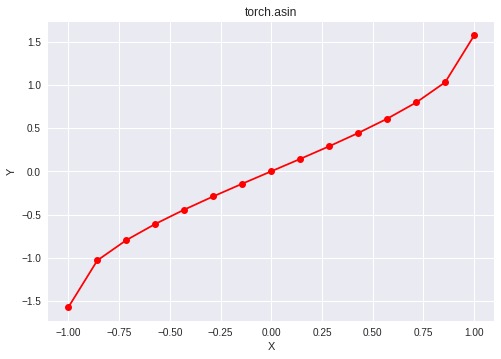PyTorch是由Facebook开发的开源机器学习库。它用于深度神经网络和自然语言处理。
函数torch.asin()为PyTorch中的反正弦函数提供支持。它期望输入在[-1,1]范围内,并以弧度形式给出输出。如果输入不在[-1,1]范围内,则返回nan。输入类型为张量,如果输入包含多个元素,则将计算按元素的反正弦值。
用法: torch.asin(x, out=None)
参数:
x:输入张量
name(可选):输出张量
返回类型:与x具有相同类型的张量。
代码1:
# Importing the PyTorch library
import torch
# A constant tensor of size 6
a = torch.FloatTensor([1.0, -0.5, 3.4, 0.2, 0.0, -2])
print(a)
# Applying the inverse sin function and
# storing the result in 'b'
b = torch.asin(a)
print(b)输出:
tensor([ 1.0000, -0.5000, 3.4000, 0.2000, 0.0000, -2.0000]) tensor([ 1.5708, -0.5236, nan, 0.2014, 0.0000, nan])
代码2:可视化
# Importing the PyTorch library
import torch
# Importing the NumPy library
import numpy as np
# Importing the matplotlib.pylot function
import matplotlib.pyplot as plt
# A vector of size 15 with values from -1 to 1
a = np.linspace(-1, 1, 15)
# Applying the inverse sine function and
# storing the result in 'b'
b = torch.asin(torch.FloatTensor(a))
print(b)
# Plotting
plt.plot(a, b.numpy(), color = 'red', marker = "o")
plt.title("torch.asin")
plt.xlabel("X")
plt.ylabel("Y")
plt.show()输出:
tensor([-1.5708, -1.0297, -0.7956, -0.6082, -0.4429, -0.2898, -0.1433, 0.0000,
0.1433, 0.2898, 0.4429, 0.6082, 0.7956, 1.0297, 1.5708])

相关用法
- Python PyTorch tan()用法及代码示例
- Python PyTorch sin()用法及代码示例
- Python PyTorch cos()用法及代码示例
- Python PyTorch cosh()用法及代码示例
- Python PyTorch tanh()用法及代码示例
- Python PyTorch sinh()用法及代码示例
- Python PyTorch acos()用法及代码示例
- Python PyTorch atan()用法及代码示例
- Python sympy.asin()用法及代码示例
- Python Tensorflow asin()用法及代码示例
- Python next()用法及代码示例
注:本文由纯净天空筛选整理自vaibhav29498大神的英文原创作品 Python | PyTorch asin() method。非经特殊声明,原始代码版权归原作者所有,本译文未经允许或授权,请勿转载或复制。
